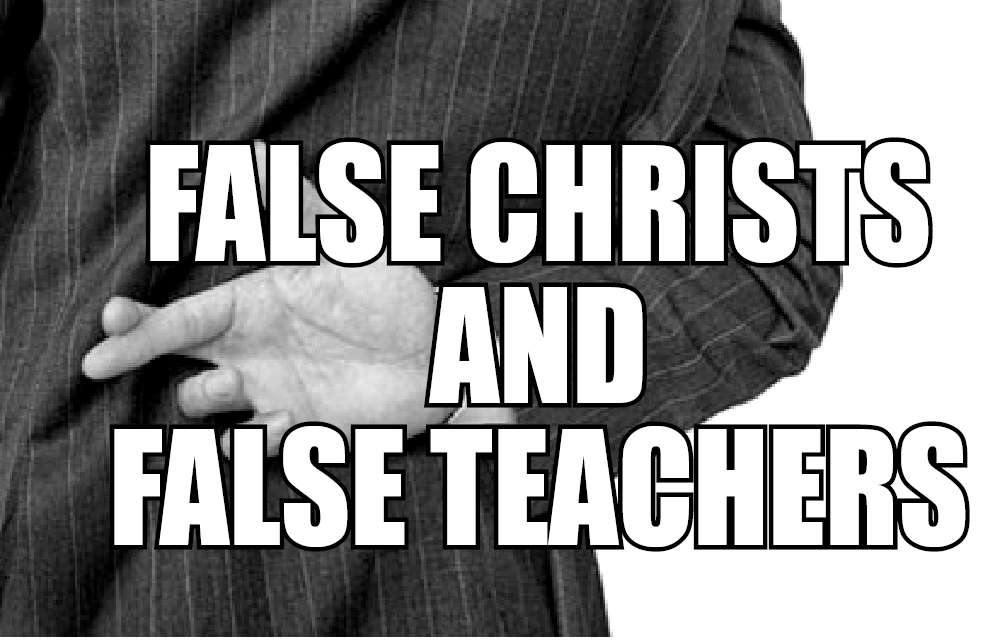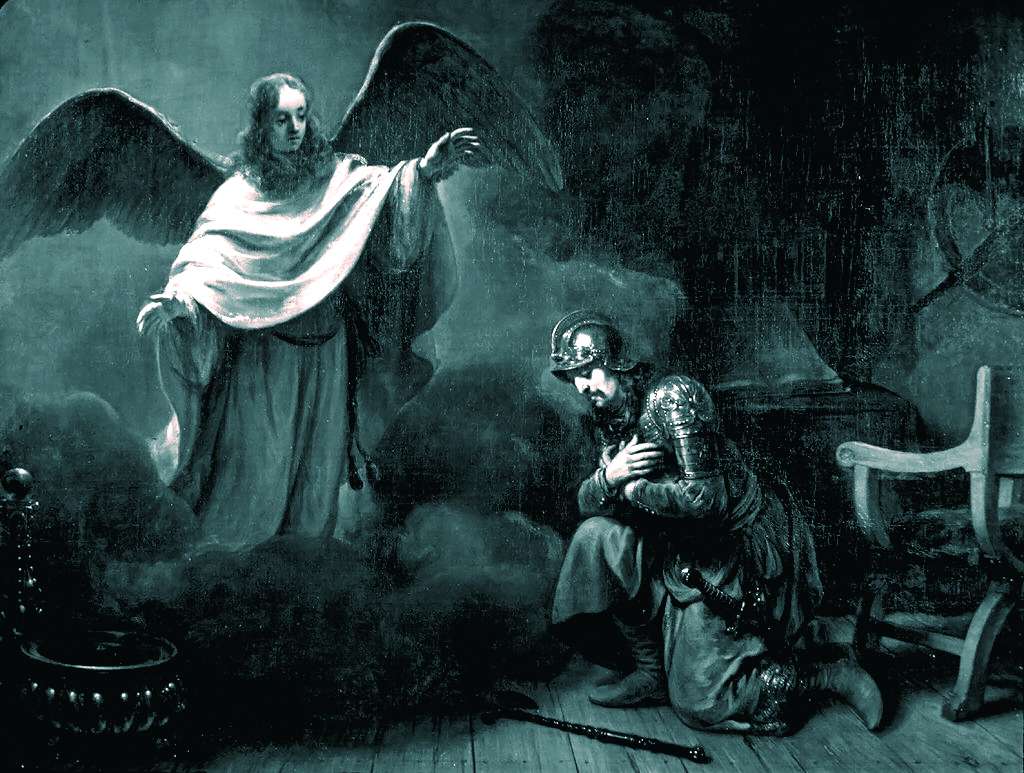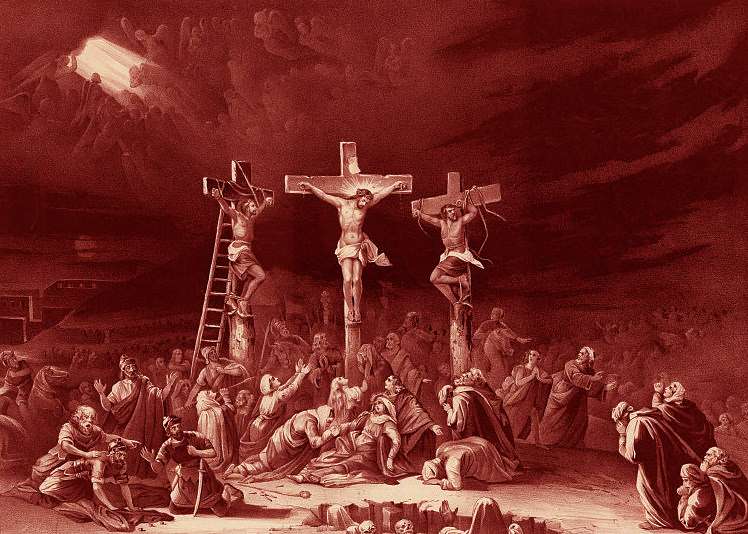

False Christs and False Teachers
Dr. C. T. Luiskutty
History of mankind is replete with stories of false Messiahs (Christs) who claim to be the incarnation of Almighty God. This happened many times before the coming of Jesus Christ, the true Messiah, and has not stopped with His coming to this earth and fulfilling His mission.
Jesus Himself knew about the appearing of false Messiahs and false teachers and prophets at various times and issued a warning, “For there shall arise false Christs, and false prophets, and shall show great signs and wonders; so as to lead astray, if possible, even the elect” (Mat 24:24). This is happening today and the people of God should be extremely careful so that they will not go after the imposters. Some of them are outright antichrists who have no resemblance to Jesus of Nazareth and oppose Him and His teachings vehemently. Others may, to a great extent, teach many things Jesus taught but present themselves as improved versions of Jesus Christ. False Christs are more likely to draw followers from outside the church than from inside. Still church people who do not have a solid foundation in the Word of God could be influenced by such imposters. False prophets and teachers in the churches are a greater threat to Christendom than are false Christs. The false teachers, referred to here, are not people who promote false Christs, but the ones who make a false representation of Jesus Christ and propagate a false ‘gospel’.
If the believers are not careful, even the elect could be led astray by the subtle doctrines taught by the false teachers. Christians should beware of two things the false teachers try to do. The first is to present a false picture of Jesus Christ. They start with the true Messiah, Jesus Christ of Nazareth, the historical person who lived about two thousand years ago. Many of them start their ministry teaching the orthodox views about Jesus Christ and the true gospel. However, as the following becomes large and most people in the crowd have no foundation in the Word of God or a desire to learn the true doctrines, the teachers seek for new ideas to appease their itching ears and capture their attention and allegiance.Thus they look for new revelations and new ideas. As they propagate new ideas which have no scriptural backing as new revelations of God, the undiscerning congregation swallows everything because they are enamored by the charisma of the teacher or his or her miracle working power and looking for excitement and instant gratification. When somebody says to an audience that consists of mature Christians that he or she is going to tell them a new truth that they have never heard before, the chances are what comes next is extra-biblical or anti-scriptural. It is unfortunate that the number of teachers who make such statements in Christian churches is increasing these days. What is stated in Acts 17:21 (Now all the Athenians and the foreigners who lived there would spend their time in nothing except telling or hearing something new)is about a general pagan crowd assembled in a public place. It is ironic that Christian congregations have degenerated to this level and would spend time in nothing except hearing something new. As a result, their assemblies have become fertile grounds for false teachers who would spend their time in nothing but telling something new which, almost always, is not in the Bible or is an interpretation the person who wrote it or the God who inspired the writing never intended.
Some characteristics of the false teachers who could influence Christians:
1. They deny the authenticity of the whole Bible
2. They present a false picture of Jesus Christ
3. They distort the teachings of Christ and the Apostles
1. It is true that we do not understand everything in the Bible. Listen to what Apostle Peter says, “… our beloved brother Paul also wrote to you according to the wisdom given him, … there are some things in them that are hard to understand, which the ignorant and unstable twist to their own destruction, as they do the other Scriptures” (2 Peter 3:15-16). It is evident from this statement that some of what Apostle Paul wrote was hard to understand and ignorant and unstable readers distort these writings to suit them. But Peter does not deny the authenticity of what Paul wrote. According to Peter, Paul wrote according to the wisdom given to him and those who distort the teachings just because they cannot fully comprehend them do so to their own destruction.
Some people do not accept whole of the Old Testament or some portions of it as God-inspired writings. The reasons for such a position are:
We may not understand what is written there
We may not like the writings as they might contradict our view of God or moral values and cultural norms of our time
We may consider them unnecessary for our salvation, spiritual growth and stability in our faith.
These are not the criteria to determine the authenticity of any portion of the Bible. Jesus Christ and the New Testament authors quoted from many of the Old Testament authors. When the apostles referred to the God inspired nature of the Scriptures, they were referring to the Old Testament. If what is Scripture and what is not is left to the individual’s choice, we will be opening a Pandora’s box. Anyone who attempts to do this and teach such doctrines should be recognized as a false teacher.
By faith we accept that the whole of Bible in its original writing is God-inspired and without error. It does not mean that all the writings are of equal importance in the life of a Christian or the interpretations and commentaries are God-inspired.
Some teachers argue that the church needs only the four gospels as they contain the example and teachings of Jesus Christ. They think the rest of the Bible is used to create a religion rather than form individual followers of Christ. The reasons in this case also may be
They may be containing only the opinions of the writers
We don’t like what is in them because that may contradict our convictions or we may have to pay a high price to put it in to practice.
The principles mentioned in the epistles are outdated and irrelevant for the present age
There are portions (especially the Book of Revelation) that are beyond our comprehension.
The apostles wrote the letters as they were inspired by God and directed by the Holy Spirit. They rewrote many of the abstract concepts of the gospels putting them in proper context and giving applications. The epistles challenge the followers of Christ to face opposition and persecutions with boldness and trust in God. They were assured of the hope of eternal life in the presence of God. The letters analyzed the condition of various churches and showed them the way how the followers can achieve Christlikeness. Such inspiring teachings in the New Testament letters are not opposed to the character and teachings of Jesus Christ as given in the gospels, but complementary to them. Even though the allegories and visions of Revelation may not be clearly comprehended by all readers and the interpretations may vary, there is enough spiritual truth that will inspire Christians and motivate them to live a holy life preparing to welcome whatever transpires in the future. They live in the present with the hope of eternity.
All the false teachers may not deny outright the authenticity of the Bible, but they will sow seeds of doubt in the hearts of the hearers.
2. There are religions, even sects who claim to be Christian, that approve Jesus as a great teacher or even as a prophet but deny His divinity. From the first century there has been a widespread tendency and discussion in order to deny the doctrine of two simultaneous natures of Christ being fully man and fully God. While Apollinarius (Bishop of Laodicea), Nestorious (Bishop of Constantinople) and Eutyches (Monk in Alexandria) tried to attack the humanity, Lucian of Antioch, Eusebius of Nicomedia and Arius of Alexandria denied the deity of Jesus Christ.
The Arian view which took hold from the early centuries is that the Logos (Jesus) did not exist from the beginning but was begotten by God the Father at some finite time before the creation of the world. He was a medium through which everything else in the universe was created. According to this view, the Son of God is subordinate to the Father. In other words, Jesus is a being below God but above the rest of the created beings including man. Many modern sects propagate this view in different forms.
The Apostolic and Nicene creeds vehemently countered these heresies and emphatically articulated the absolute humanity and deity of Jesus Christ. This is the position adopted by orthodox Christianity from the beginning. The orthodox Christians teach the doctrine of Trinity. It claims, in short, that while there is only one God (Deuteronomy 6:4) He exists as three persons – the Father, the Son and the Holy Spirit. The three persons co-exist and are co-eternal and co-equal. All three persons have all the natural attributes (omnipotence, omnipresence, omniscience, immutability, eternal self-existence) and the moral attributes (love, holiness, goodness, truth, righteousness and justice) of God. The three persons are not competing deities and each fulfills His function in creation, preservation, salvation and provision of eternity for the mankind. The concept of Trinity might not be easily comprehended by our natural mind; this is a Biblical truth that the believers must accept by faith. Anyone who spreads a “gospel” different from this can be considered a heretic and a false teacher.
Now there is a trend among some preachers and teachers in the Christian church to show a distinction between Jesus and Christ. According to them Jesus lived and performed miracles until His death on the Cross; the resurrected Jesus became Christ. They contend that one gets the knowledge about Jesus through a study of History, but the knowledge of Christ comes only through revelation. This is an attempt to revise the gnostic ideology that Jesus is distinct from Christ. According to gnostic creed Jesus was an ordinary man, the son of Joseph and Mary. Christ was a spirit of power that descended upon Jesus at baptism and at the time of crucifixion Christ left Jesus and it was Jesus who suffered and died. This was condemned by the apostles (Acts.9:20, 17:3) and they proved that Jesus was the Christ.
When we realize that ‘Christ’ is the Greek term used in the place of the Hebrew term ‘Messiah,’we realize that this argument does not hold water. At His birth He was given the name ‘Jesus’ (which means ‘Saviour’) by His mother Mary and adoptive father Joseph. Even though the Jewish scholars and the leaders knew that the Son of God would appear as the Messiah (Christ, God’s Anointed One) some time in history, they were not ready to acknowledge that Jesus was the One. But Peter and others came to know by faith that He was the Christ, as it was revealed to them by the Father (Matthew 16:16,17). In the early days of His public ministry Jesus reveals to a Samaritan woman, who had the hope of the coming Messiah that He was the one for whom she was waiting. Now throughout the writings of the Apostles, we see the names Jesus and Christ used either interchangeably or together as a compound name. From this it is evident the those who insist on separating Jesus and Christ are false teachers and may be doing this to claim that they have post-biblical special revelation or higher knowledge compared to the teachers who stick to the true gospel.
When a preacher or teacher presents only a one-dimensional Jesus, that person is giving a false picture of the true Messiah. These days many ministers are concerned only about the material prosperity and physical well-being of the crowd. As a result, all spiritual gatherings are venues where self-seeking people (Christians and non-Christians) come together looking for miracles to gratify their desire for material and physical things. Even “worship” becomes a ploy for appeasing God so that He might give what we ask for, rather than being an expression of our devotion, love and honor for a great God who saved us and does take care of us as we are His children. Such false teachers feed on the selfish greed of the masses and exploit their weakness to gain material wealth or fame. Jesus is not a magician to perform a miracle whenever a crowd assembles, a physician to hand out a panacea for every sickness, a banker who erases all debts, a university president who gives away degrees and honors to all or an employer who gives top jobs and high salaries to everyone who professes to be a believer or to every contributor to a given ministry. Since He is God, He is able to do all these and will do as He sees fit. But the most important thing that He wants to do is to save the sinners and help the saints to live a holy life preparing to spend eternity with Him.
3. Apostle Paul says, “But by the grace of God I am what I am, and his grace toward me was not in vain. On the contrary, I worked harder than any of them, though it was not I, but the grace of God that is with me” (1Co 15:10). It is beyond question that the mainstay of Christian faith and living is the grace of God. However, there are teachers in the church who over-emphasize the grace to the point of ignoring holy living. According to them we are saved by grace and then grace covers everything. Even though this may sound harmless, implicit in this type of teaching is the error that those who make a confession of faith and receive God’s grace for salvation can continue to follow a worldly lifestyle satisfying the desires of the flesh. What they present is a warmed up version of old docetism which argued that only spirit is good, flesh (body) is inherently bad and what one does in the body has no bearing on his standing with God. Paul insists that the born again believer should not consider the grace as something that has no effect on his or her living. Grace is still needed and available but the believer has to appropriate the grace and enter in to a holy life pleasing to God.
In his introduction to the Epistle of Jude, Chuck Swindoll, paraphrasing the statement of the apostle writes, “A number of deceivers with ungodly motives have slipped into the church. They need to be exposed!” He goes on to add, “They were the hedonistic folks of that day. They were the people who said, ‘Pleasure at any price.’ They took the amazing grace of God and twisted it to meet their own selfish desires in their mad scramble to do whatever they felt like doing, whatever made them feel good. And what they felt like doing was to practice immorality. On the top of that, if you look closely they ‘deny Jesus Christ our only Sovereign and Lord.’ Jude screamed out, in effect, ‘We must fight against these lies!’ Strong, passionate words still needed in our day!”
No wonder if large crowds go after such teachers! They are looking for eternal life in heaven (or at least escape from hell) and at the same time pleasure filled, licentious, happy living on the earth. False prophets, like soothsayers, prophesy a bright fun filled future, false preachers show them how they can attain it with low investment and false teachers propagate it quoting selected Scripture verses and giving their interpretations to satisfy their vested interests, while ignoring the overall gist of Jesus’ and the apostles’ teaching. The devil who works behind not only the end-time antichrist but also through all the antichrists of the church age perform miracles to attest to their teachings so that the seekers can be kept away from following the Truth and “contending for the faith.”What Jesus said in His Mount Olives discourse is relevant in the present generation. “False christs and false prophets will arise and perform signs and wonders, to lead astray, if possible, the elect” (Mar 13:22). The elect needs to take extra care that they are not deceived and led astray as there is a preponderance of such ministry and teaching today even in the churches that profess to hold on to Biblical teachings and values. Church leaders and Christians need to wake up from their lethargy and teach and learn “to contend for the faith that was once for all delivered to the saints” (Jude 1:3).















